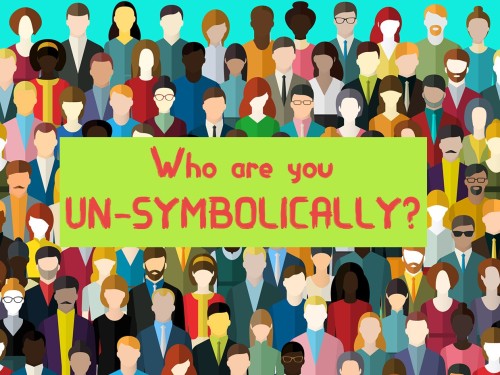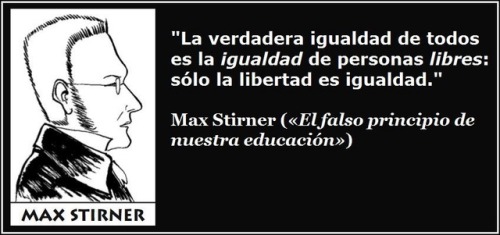#max stirner

“Insanity in individuals is something rare - but in groups, parties, nations and epochs, it is the rule.” - Friedrich Nietzsche.
The friends of freedom are offended by selfishness, because in their religious striving for freedom they cannot free themselves from divine “self-abnegation,” Egoism upsets libertarians, because an egoist does not care about a thing for the sake of the thing. If he or she cares about anything, it is for her or his own sake. It is egoistic not to ascribe an “absolute” value to anything, but to seek the value of everything in me.
-Max Stirner, Freedom and Self-Ownership
My freedom is diminished if I cannot impose my will on something outside of myself, whether something inanimate, such as a boulder, or something wilful, such as a government or an individual boss. I diminish my self-ownership if I resign myself to the loss of my freedom, give up, yield, or humiliate myself in loyalty or submission. It is one thing to discontinue an enterprise which is not succeeding, or turn off a wrong road, and quite another thing to surrender. I go round a boulder, until I have enough gunpowder to blast it out of the way. I circumvent the rule of a nation, until I have gathered the strength to overthrow it. I cannot reach the moon, but does that mean I must regard it as “sacred”? I do not surrender to you, I only wait. When I can come at you I will; and meanwhile, if I can find any weakness in you, I will draw it to your attention…
-Max Stirner, Freedom and Self-Ownership

To be governed is to be watched over, inspected, spied on, directed, legislated, regimented, closed in, indoctrinated, preached at, controlled, assessed, evaluated, censored, commanded; all by creatures that have neither the right, nor wisdom, nor virtue… To be governed means that at every move, operation, or transaction one is noted, registered, entered in a census, taxed, stamped, priced, assessed, patented, licensed, authorized, recommended, admonished, prevented, reformed, set right, corrected. Government means to be subjected to tribute, trained, ransomed, exploited, monopolized, extorted, pressured, mystified, robbed; all in the name of public utility and the general good. Then, at the first sign of resistance or word of complaint, one is repressed, fined, despised, vexed, pursued, hustled, beaten up, garroted, imprisoned, shot, machine-gunned, judged, sentenced, deported, sacrificed, sold, betrayed, and to cap it all, ridiculed, mocked, outraged, and dishonoured. That is government, that is its justice and its morality!
PIERRE-JOSEPH PROUDHON
Man is truly tree only among equally free men.
MICHAEL BAKUNIN
Every State is a despotism, be the despot one or many.
MAX STIRNER

A revolution doesn’t guarantee freedom, rather it guarantees oppression under a different system. Insurrection guarantees freedom since no matter who makes what rules, they won’t be obeyed. Saying you’ll only obey just and ethical rules won’t work. You can’t pick and choose since what is seen as just and ethical for one group may be seen in the opposite light by another. The same goes for morality, which we all know should be written in the same book as ghosts, unicorns, elves and dragons.

Rights are spooks. The only “rights” that exist are what you can take and keep for yourself.

THE MILKMAN COMETH!

And the Holodomer was a myth. Change your mind.

Where’s the breakfast, Rick, you fucking nerd!

There’s always a way out.

Max Kirby

Nice spooks, nerd.
—Anne Fernihough, “Introduction,” The Rainbow by D. H. Lawrence (Penguin, 1995)
I didn’t have room to quote the above in my essay, just published yesterday, on Lawrence’s The Rainbow, but you can take it as my epigraph. In my treatment of the subject, I first suggest that a paradigmatic female modernist like Woolf, insofar as she was a modernist, was no less a partner in this “suppression…of political movements” (and the same goes for Stein, Barnes, Moore, Loy, and more, to varying degrees all non-leftists or even in some cases rightists). Then I go so far as to defend the instinct that won out here: the higher politics of the aesthetic over the low politics of mass movements with their designs on state power. Needless to say, this is a very timely prior instance of the same decoupling of bohemian from activist, of aesthetics from militancy, that we see today.
Speaking of all that, while mainstream elite culture is having a D. H. Lawrence moment, I’m surprised he’s not more present in the online extremist countercultures. He has that same Mishima quality, anticipating extremely-online male social outcasts, of being somehow perfectly poised between trans and Nazi, now dipping toward one side, now to the other, but somehow always keeping a precarious balance, in the art if not the life, the would-be mail-fisted fascist as tremulous adolescent girl. I think of how John Carey, in his roll-call of modernist fascism The Intellectuals and the Masses, pauses to exonerate Lawrence of his more troubling tendencies on the grounds that he was, in the end, just a sensitive soul who read Neech too early:
It must be stressed that Lawrence, for all his Nietzschean debts, was not like Nietzsche. The range and subtlety of his imagination went far beyond Nietzsche’s. The Nietzschean warrior ideal, and countenancing of cruelty, could only have seemed disgusting to Lawrence, who turns his characters not into warriors but into flowers. […] To cite such passages—and there are hundreds of them in Lawrence—and to contemplate the impossibility of Nietzsche having written them, is not just to emphasize that Lawrence was a poet and that Nietzsche was in some respects a desperately restricted and unfulfilled human being. It is also to contend that, for Lawrence, the stance of natural aristocrat, with its presuppositions of isolation and alienation, was adverse to all the promptings of his sympathetic imagination, which taught him to fuse and integrate.
The Rainbow is too long, but someone please make the NEETs read “Medlars and Sorb Apples” or “The Prussian Officer” at least. (Why does Mishima get all the attention? Strange that even fringe culture is dominated by the annoying presumption that if it’s translated it must be better.) In my essay I quote this passage from The Rainbow:
She never felt sorry for what she had done, she never forgave those who had made her guilty. If he had said to her, “Why, Ursula, did you trample my carefully-made bed?” that would have hurt her to the quick, and she would have done anything for him. But she was always tormented by the unreality of outside things. The earth was to walk on. Why must she avoid a certain patch, just because it was called a seed-bed? It was the earth to walk on. This was her instinctive assumption.
Here is my official comment, perhaps too Bloomian in its excited swoop through the canon:
Here we remember that Lawrence is the Englishman who put the gnostic-individualist literature of American Romanticism on modernism’s map. Ursula might be the daughter of Hester Prynne and Captain Ahab, her adventures chronicled by a prose Whitman.
My unofficial comment is that this is possibly my favorite paragraph from the novel because it expresses (I confess!) exactly how I felt as a child.
Post link
Renzo Novatore’s eulogy on Bruno Filippi
Who was he? Where was he going?
Fools! And where have you gone? Where are you going?
He was broken while breaking the chains that you, united in a cowardlyandhateful way in your manifold quality as dangerous lunatics, riveted logically and morally to his twenty year old rebel wrists in order to crushhis Uniqueness,his mystery, because he wasincomprehensibleto you, precisely as the complicated mind of one who feels complete in himself must be. Bruno Filippi hated. But the forces of Hatred did not crush the powers of Love within Him. He immolated himself in a fruitful embrace with death because he madly loved Life. We have the need and the entitlement to say of him that which was said of the D’Annunzian hero: “That the slaves of the marketplace turn around and remember!”
-In the Circle of Life
In Memory of Bruno Filippi
Post link







